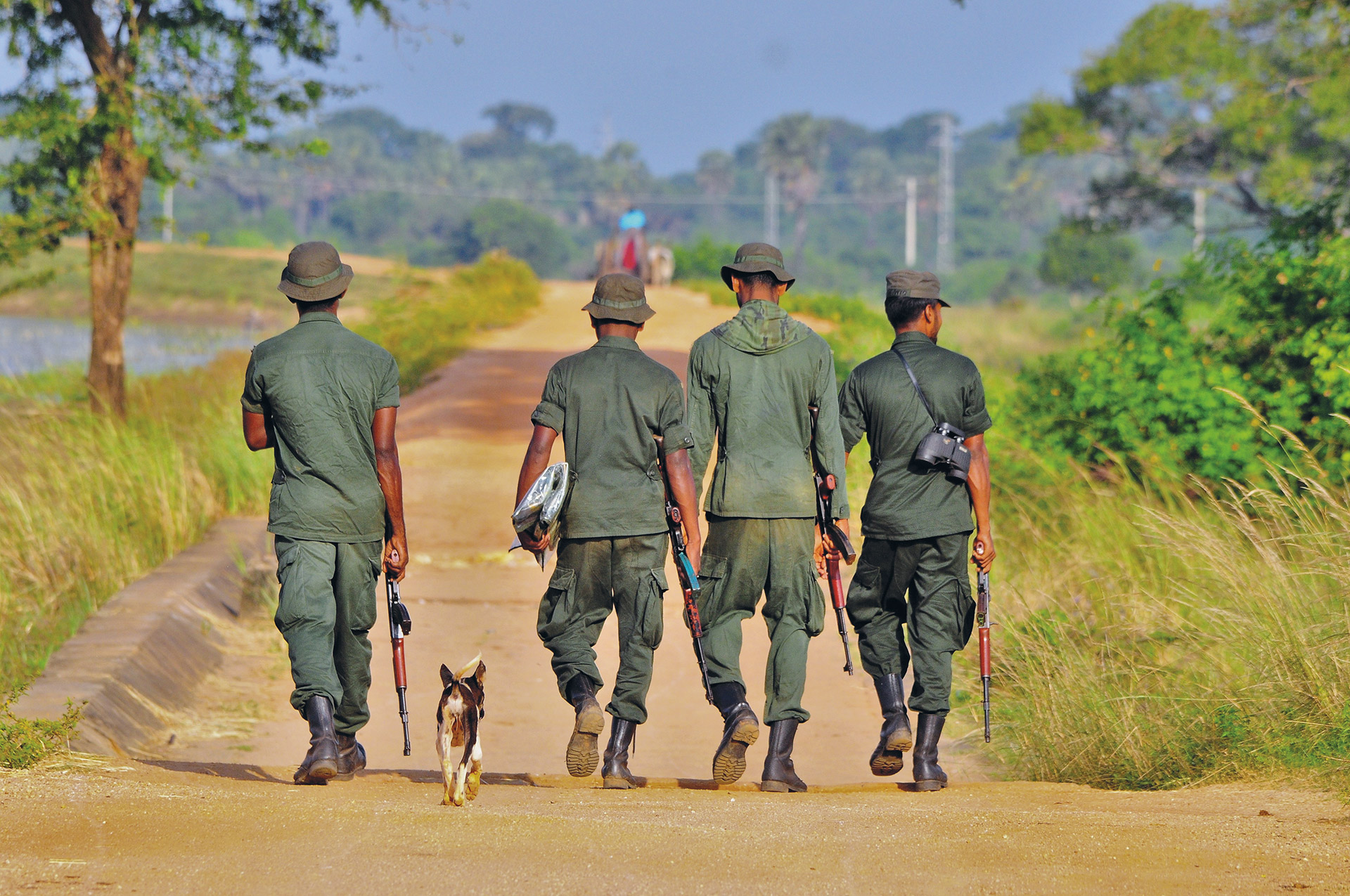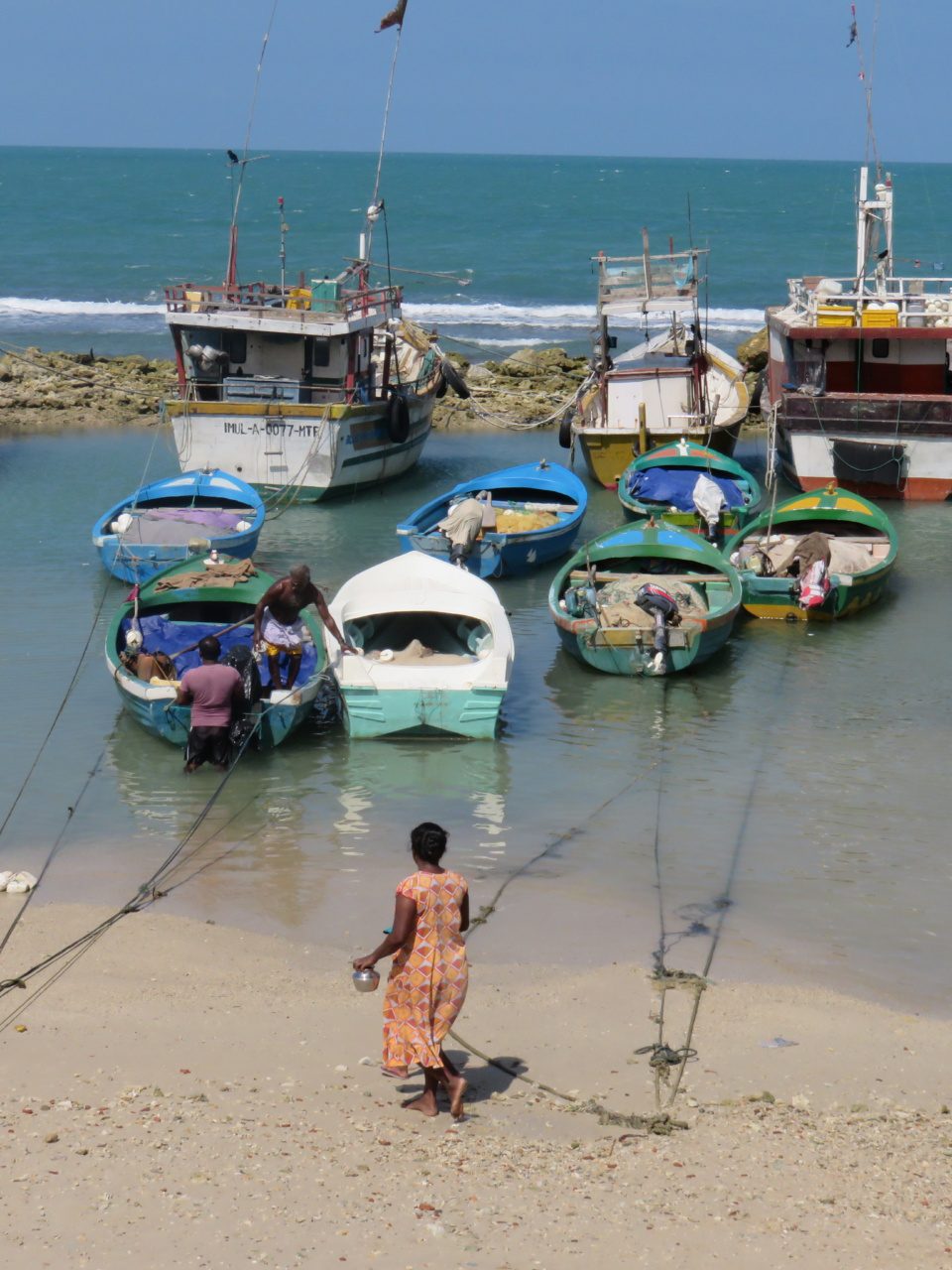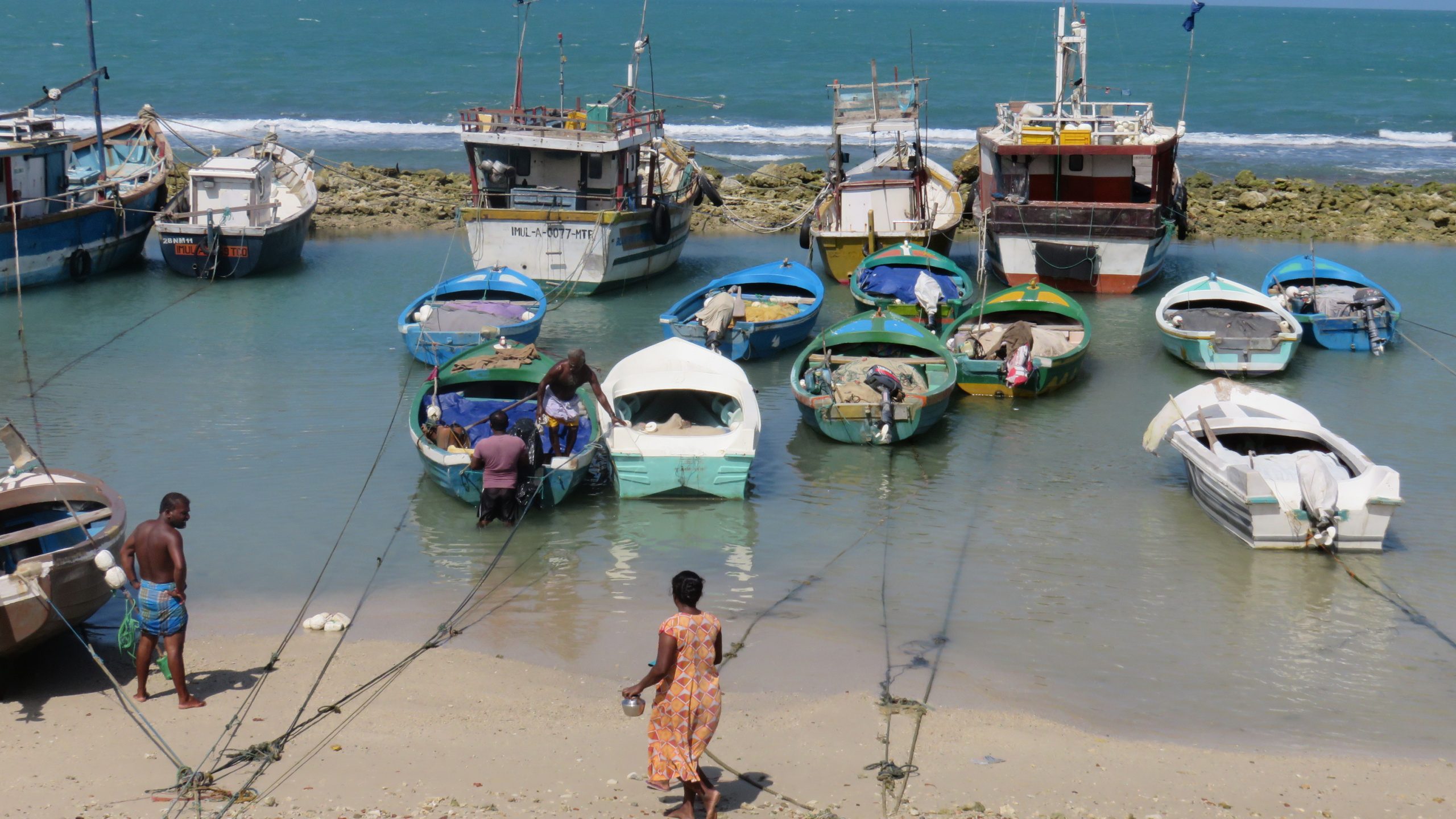The STP concludes land rights campaign – displaced persons fight on for their rights
From 2014 until 2019, the Society for Threatened Peoples (STP) has campaigned for the land rights of the Tamil-speaking minority in Sri Lanka. Together with its local partner organisation, the National Fisheries Solidarity Movement (NAFSO) and the people affected, it has achieved some notable outcomes. Now the STP is bringing its campaign to a close. The broad movement that developed is now acting independently of the STP and continues to lobby for the restitution of land occupied by the military.
In the last five years, the STP has supported people in Sri Lanka affected by land grabs, by means of reports, workshops and petitions to the UN and the Human Rights Council, so that they finally regain the land that has been occupied by the military during the civil war. It also drew attention to human rights abuses brought about by the growth of tourism, which in some areas led to the forced displacement of the local population.
In several cases the protests were successful. For example, the inhabitants of the island of Iranaitivu finally had their land returned to them in 2018 after many years of occupation. Families on the Jaffna Peninsula in the north of Sri Lanka are also gradually able to leave the camps for internally displaced persons and return to their land. In other cases, no land or only a small part of it has been given back and court decisions are often still pending. This is why, for example, people in Keppapulavu und Silawathurai are still protesting tirelessly for the return of their land.
The numerous workshops organised by the STP contributed significantly to informing the people concerned of their rights and enabled them to network. Through these exchanges and contacts with local organisations, they now have sufficient knowledge and skills to be able to fight injustices independently. We at the STP would like to extend our warm thanks to our partner organisation NAFSO and to the people directly affected for the work we have been able to do together. We wish them much continued success and perseverance in the future. They have shown that tenacity pays!
On this page you will continue to find all the information about the concluded campaign. You can also read the detailed article about the five years of the land rights campaign in the June 2019 edition of our magazine Voice (in German). There you will also find an overview of the regional emphasis of the campaign.
Sri Lanka after the war
Years after the end of the Civil War, the human rights situation is still alarming in Sri Lanka - especially for minority groups. The STP informs about existing problems and educates the local communities about their rights and possibilities for action.
In 2015, when a new government was elected in Sri Lanka, the hope among the population for reconciliation, peace and development was great. However, it has not been fulfilled. The reconciliation process is endangered, and the human rights situation continues to be precarious. In this situation, the growing tourism industry is in many cases more of a curse than a blessing for the local communities.
The STP and their local partners document the situation in Sri Lanka and teach the local communities in workshops about their rights and how to stand up for them. Geographically, the focus is on the former war zone in the North and East of the country.
Militarization
Sri Lanka has experienced a bitter 26-year long civil war. The struggle for a separate Tamil state in the North and East of the island was brutally defeated in 2009 by the Sri Lankan government forces. Ten thousands of people died and millions were displaced as a result of the war. Both sides allegedly have committed crimes against humanity and war crimes. Up to the present day, the human rights situation in Sri Lanka is alarming and militarization is omnipresent.
- The military continues to hold large areas of land in the North and East of the island. In those areas, the local communities are denied access to land and sea and subsequently lose their traditional livelihood.
- The resettlement of the internally displaced people is slow, and the standard of living in the camps for internally displaced people is extremely poor.
- Torture and ill-treatment of detainees, arbitrary arrest and detention, surveillance and harassment of civil society and journalists are still common in Sri Lanka.
- The discrimination of ethnic and religious communities jeopardizes the reconciliation process.
Tourism and human rights
Sri Lanka is a booming tourist destination. With over 26,000 visitors in 2016, Switzerland constitutes the sixth largest tourist group from Western Europe. Tourism should primarily benefit the local population. However, a STP report of 2015, focusing on the tourist regions of Kalpitiya, Kuchchaveli and Passikudah, shows that tourism can lead to human rights abuses:
- The Sri Lankan Tourism Development Agency (SLTDA) does not inform and consult the local communities about upcoming tourism projects.
- The minimum environmental and social standards are not met.
- Freedom of movement and access to the sea were restricted for the coastal communities. There have been illegal land seizures and evictions.
The local population hardly benefits from tourism and, on the contrary, in some cases even loses its traditional livelihood due to tourism projects.
Land grabbing in the Vanni area
In the north of Sri Lanka, militarisation is particularly high. Especially in the Vanni area, many Tamils live under precarious conditions because of the ongoing military occupation of their land. Land grabbing by the military is a ubiquitous problem, causing various difficulties for the population:
Due to the military exclusion zones, access to cultivated agricultural areas and to fishing grounds is no longer guaranteed. The local population's traditional livelihoods are curtailed or lost altogether. As a result, food security is also no longer guaranteed.
Losing a property that has been farmed for generations robs people of their cultural roots and social networks.
Land grabbing in the Vanni region
Video: Story of John Kennedy
In Northern Sri Lanka's Vanni area, where the last offensives of the war unfolded, the military still occupies large sections of land. Due to these land occupations, many affected Tamils live in severe poverty.
In the Vanni area, the unresolved land issue is particularly virulent: In the course of the heavy fighting between government troops and the Liberation Tigers of Tamil Eelam (LTTE), almost the entire local population was displaced, while infrastructure and livelihoods were largely destroyed. In relation to the population, the military presence in this region is currently higher than anywhere else in Sri Lanka. Due to land grabbing by the military, access to cultivated agricultural areas and to fishing grounds is not guaranteed. As a result, the local population's traditional livelihoods are curtailed or lost altogether, meaning that food security is also no longer guaranteed.
In many places, this situation led to protests among the local population in 2017, some of which are still continuing today. The people are demanding their land back, sometimes successfully. For example, protests by residents of Pilakudiyiruppu and Puthukudiyiruppu in the north of Sri Lanka have led the military to give parts of the land back to the population. However, it is not always possible to live on the released land: The houses are ruined and the fields are so overgrown that they are inaccessible. Those returning to the land are given insufficient support, or none at all, when it comes to rebuilding infrastructure and securing their livelihoods. The current precarious living conditions and the protests show that the ongoing militarisation and the land grabbing have further marginalised the population affected by the war.
Iranaitivu - a success for the STP campaign
The GfbV campaign for land returns in the Vanni area of Sri Lanka has had a success: In mid-May, the Navy returned its land to the inhabitants of the island of Iranaitivu. For the people of Iranaitivu, this means that from now on they will be able to fish and collect seafood without restriction - and that people will be able to earn a good income again.
Emeliyanus Pillai from Iranaitivu says: "We are very happy that we got our country back and would like to thank the GfbV for their support in our fight against the land theft. However, our struggle continues as we urgently need help in the reconstruction of our homes and infrastructure."
After the civil war in Sri Lanka, the navy occupied the small island of Iranaitivu as a military base for years, so that the former inhabitants could not return. This meant a strong restriction of their economic possibilities. Since May 2017, supported by the GfbV, they have successfully fought for the return of their land.
How the STP works
Under the motto "We want our land back!", the STP, together with its local partner organisation National Fisheries Solidarity Movement (NAFSO), is striving to get the occupied land released. This, alongside local and international advocacy work, is to boost the self-confidence of the (affected) local population first and foremost. For this purpose, the STP has compiled a report on the land issue in the Vanni area, organised local workshops for those affected and drawn the UN Human Rights Council’s attention to the problem. In 2017, the STP also supported several protests – with partial success: one protesting community supported by the STP was given part of its land back.
The STP and its partner organisation NAFSO call on the Sri Lankan government to do the following:
- Reduce the military presence in the Vanni area and put an end to the monitoring of the local population.
- End the military's commercial activities.
- Make all occupied areas publicly accessible, return them to their original owners and consult the internally displaced persons on the resettlement process.
- Help the resettled internally displaced persons to re-establish their traditional livelihoods, sufficiently cover their basic requirements, such as drinking water, electricity and sanitary facilities, and ensure that they have access to education and medical facilities.
Reports /press releases
Militarization

Armed soldiers in Sri Lanka. Photo: Walter Keller
Years after the civil war, the people of Sri Lanka still suffer under the consequences of the war. Many of the existing problems result directly from the ongoing militarization: the military not only keeps the local population under its control, but also occupies large areas of land and is involved in commercial activities.
The STP’s report on the militarization on the Jaffna peninsula, published in fall 2016, clearly shows how the consequences of the war are visible until today. For instance, the military is occupying large areas of land where inhabitants have lost access to land and sea, and, therefore were deprived of their traditional livelihood as farmers and fishers. The resettlement of the innumerable internally displaced people progresses slowly, and living conditions are precarious in the camps for the internally displaced people. In addition, the economic activities of the military in tourism and agriculture robs important sources of income for the local communities.
In January 2015, the incumbent President, Mahinda Rajapaksa, known for his authoritarian regime, lost the election to Maithripala Sirisena. The new presidency broke with the previous government’s authoritarian and repressive practices. However, the human rights situation has not significantly improved since Sirisena’s election. Torture and ill-treatment of detainees, arbitrary arrest and detention, surveillance and harassment of the civil society and journalists are still common in Sri Lanka. Furthermore, ethnic and religious minorities in Sri Lanka continue to experience discrimination.
How the STP works
Together with its partner organization "National Fisheries Solidarity Movement" (NAFSO), the STP has been drawing attention to the human rights situation in Sri Lanka, the problem of impunity and the negative effects of the strong military presence for many years. In October 2016, an event for the presentation of the report on militarization on the Jaffna Peninsula was well attended, although some participants had received threats over the phone from the military beforehand. Representatives of politics and the church, fishers unions and local authorities as well as the local communities were pleased by the fact that the STP openly addressed the problems of militarization.
Since then, the STP has organized several workshops in order to educate the local communities about their rights and identify possible actions. In April 2017, approximately 50 people attended a workshop in Jaffna. The participants, all affected by land grabbing, came from diverse regions and ethnic communities. It was important for them to hear that members of other ethnic communities were facing similar problems. The participants summarized their demands in the "Nallur Declaration" and presented them to the media. The first success has been achieved already: in July 2017, Myliddy harbour on the Jaffna peninsula was released after 27 years of occupation. The harbor is of great importance to the population; the access to its immense fishing grounds secures the basis of life for many of them.
These are the STP's demands on the Government of Sri Lanka (GoSL):
- Implement the recommendations of the UNHRC Resolution 30/1 on promoting reconciliation, accountability and human rights in Sri Lanka
- Reduce the military presence and order the military to cease surveillance, intimidation and harassment of the local population and civil society
- Order the military to cease all commercial activities by dismantling military-run hotels, farms and other businesses
- Ensure land rights for internally displaced peoples (IDPs) by releasing all occupied areas to the public and resettle all IDPs on their traditional land
- Consult the displaced people on the resettlement process and make them aware of the resettlement plan. IDPs must participate in the implementation of the resettlement process.
Tourism
The SRF programme "Mitenand" has portrayed our project and Ariya Pushpam who was personally affected by this issue. We are conducting training and mobilization programmes in Sri Lanka, in which Ariya and other affected individuals are informed about their rights and learn to defend themselves.
The SRF programme "Mitenand" has portrayed our project as well as Ariya Pushpam who was personally affected by land grabbing. We are conducting training and mobilization programmes in Sri Lanka, in which Ariya and other affected persons are informed about their rights and learn how to defend themselves.
The STP report “Dark Clouds over the Sunshine Paradise” of 2015 examines the human rights violations related to tourism projects and how the local population benefits from tourism in the three newly developed tourist regions of Kuchchaveli, Passikudah and Kalpitiya. The outcome is sobering: hotels and resorts block fishermen's access to the sea. This practice threatens the economic existence of entire families and leads to land confiscations. Only a small percentage of the local population actually make a living from tourism.
Our primary research interest is to analyze whether the implementation of tourism projects entails human rights violations and to discern the degree to which the local population actually benefits from the tourism boom. The results are sobering: in all three regions, the government’s minimal development standards have scarcely been observed. The local population is not consulted on the planning of tourism projects. Hotels and resorts block access to the sea, thus massively encroaching on the livelihood of local fishermen. Land grabbing is a major concern and only a small part of the local population is able to make a living from tourism.
How the STP works
With its report, the STP attempts to sensitize European tour operators on the one hand and to directly support the local communities on the other hand. For example, the STP, together with its partner organization "National Fisheries Solidarity Movement" (NAFSO), organized numerous workshops to present the results of the report and to highlight the rights of the local communities. Subsequently, representatives of the local communities attended round-table discussions with hoteliers and government representatives.
So far, the results show that the campaign is effective: today, the local communities and the STP's partner organization NAFSO are increasingly perceived as points of contact when it comes to tourism issues. The STP will continue to support the local communities in their concerns.
Demands on hoteliers, travel agencies and the Government of Sri Lanka (GoSL):
- Access to the sea must remain guaranteed for the local communities and not restricted by tourism projects.
- No acquisition of private land for tourism projects without compensation.
- The Sri Lankan government and tourism authorities must guarantee that, prior to the planning and construction of hotels and tourist infrastructures, the local population is consulted and has given its approval.
- Hotels, investors, local travel agencies and tour operators must act with human rights due diligence in their entire value-added chain.
The fishermen from Nilaveli:
The Society for Threatened Peoples is conducting training and mobilization programmes in Sri Lanka that brief affected fishers about their rights and teach them how to defend themselves against human rights abuses.
The fishermen from Nilaveli: The Society for Threatened Peoples is conducting training and mobilization programmes in Sri Lanka in which affected fishermen are informed of their rights and learn to fight against human rights violations.

